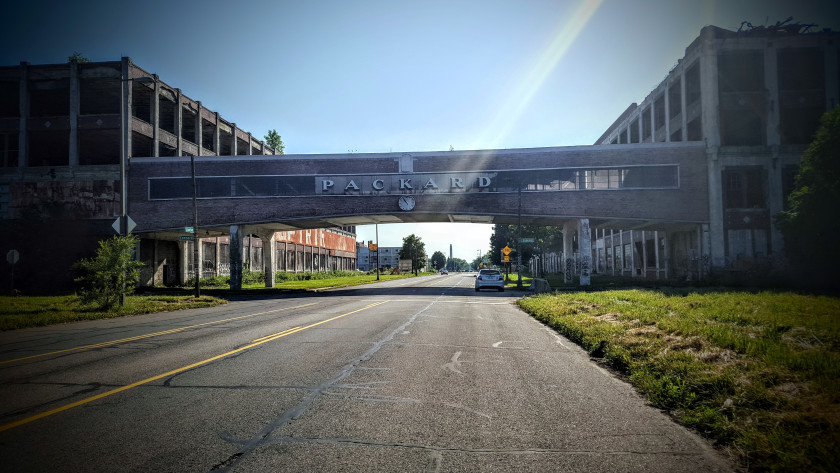The Obermann Interdisciplinary Research Grants (IDRG) foster collaborative scholarship and creative work by offering recipients time and space to exchange new ideas leading to invention, creation, and publication. For the first time in 2015, groups could choose between two- and four-week residencies. Four groups were in residence during the summer of 2015.
Linked Reading: A New Scalable Model for the Digital Humanities
David Eichmann (School of Library & Information Science, UI)
Blaine Greteman (English, CLAS, UI)
James Lee (English, Grinnell College)
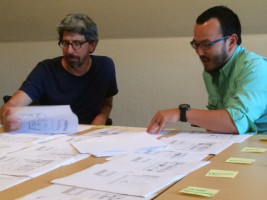
This trio was the first group to be funded by an Iowa Digital Bridges Collaborative Grant, part of the Andrew W. Mellon-funded program Digital Bridges for Humanistic Inquiry. The group’s goal was to link two separate database websites—Greteman and Eichmann’s Shakeospeare database and Lee’s Global Renaissance Project—and thus greatly build the capacity of both. Shakeospeare includes metadata about the makers and sellers of nearly 500,000 books from a 300-year period; the Global Renaissance Project includes the full texts of 25,000 early modern books.
At the heart of their project, “Linked Reading: A New Scalable Model for the Digital Humanities,” is a desire to see how such large datasets can be combined to answer a host of questions about the history of published literary texts, including the impact of those who printed, sold, and circulated these materials. During their residency at Obermann, Greteman and Lee, both Shakespeare scholars, worked on a paper about Othello as a test case. Could they garner a new understanding of the play by unifying their datasets, and what technical bumps would they hit along the way? The site they created from the merging is now live: Linked Reading: Big Data Histories. To learn more about their work, read our feature article, “Beyond the Shiny New Toy—Next Frontier for Digital Humanities.”
Media Literacy Education and the Challenge of Promoting Critical Consumption of News
Melissa Tully (School of Journalism & Mass Communication, CLAS, UI)
Emily Vraga (Communication, George Mason University)
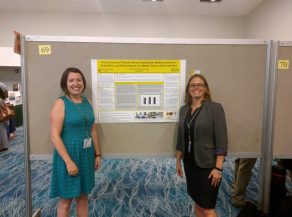
How can media literacy be taught and encouraged within media consumption itself? Vraga and Tully worked from the premise that news media literacy encourages citizens to understand both the role of the press in a democratic society and their own responsibilities to be critical consumers of news content. The two scholars developed four PSA videos, which they tested with college students on two campuses. By placing the PSAs as short ads at the beginning of actual YouTube video clips, they gained insight into the effectiveness of news media literacy messages that are embedded in other media.
Since their summer residency, Vraga and Tully have presented a paper on their preliminary findings at the 2016 Southern Political Science Association’s annual conference and submitted a paper to the Association for Education in Journalism and Mass Communication’s annual conference. In addition, they published an article about their research in the Journal of Media Literacy Education.
Developing the Terra Biblica and BAM (Big Ancient Mediterranean) Online Resources
Sarah Bond (Classics, CLAS, UI)
Paul Dilley (Religious Studies and Classics, CLAS, UI)
Ryan Horne (History, University of North Carolina)
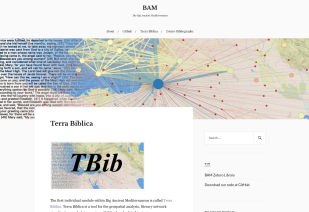 This group developed the technical framework and project workflow for BAM (Big Ancient Mediterranean), an information portal containing open-access tools and online resources that helps scholars around the world study the development of ancient social groups over multiple centuries. During their residency, Bond, Dilley, and Horne focused on Terra Biblica, a tool for the geospatial analysis/plot-mapping of biblical and related literature.
This group developed the technical framework and project workflow for BAM (Big Ancient Mediterranean), an information portal containing open-access tools and online resources that helps scholars around the world study the development of ancient social groups over multiple centuries. During their residency, Bond, Dilley, and Horne focused on Terra Biblica, a tool for the geospatial analysis/plot-mapping of biblical and related literature.
In addition to launching a beta version of the site and leading a virtual tour of the site for the Oxford Patristics Studies Conference (August 2015), the group also submitted an article for a special journal issue on Digital Classics and began planning for a major conference on BAM (the 2016 Obermann Summer Seminar).
“The two weeks of intensive collaboration at Obermann made possible through the IDRG were instrumental in launching our site,” says Paul Dilley. “Even though our work is digital, there’s no substitute for sitting down at the table together, with or without laptops, and brainstorming about the project.”
Detroit Dreams: Economic Decline, Corrosive Community, and the Future of African Americans in the Post-Industrial City
Yvonne Shirley (Filmmaker, Brooklyn, New York)
Jessica Welburn (Sociology and African American Studies, CLAS, UI)
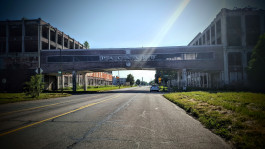
Shirley and Welburn, inspired by Detroiters’ resiliency in the face of significant obstacles, produced a documentary film that investigates how working-class and middle-class African Americans in Detroit navigate the city’s collapsed infrastructure.
Detroit once provided African Americans with the opportunity to pursue the American Dream. Many African Americans moved to Detroit during the early- and mid-twentieth century for auto industry jobs, a pathway to middle-class security. But when deindustrialization caused jobs to evaporate, African Americans’ chances for upward mobility in that city stalled. High unemployment rates, high poverty rates, high crime rates, and high levels of blight plunged Detroit into post-industrial decline. Despite these obstacles, the city remains an important place for African Americans—80 percent of the city’s population—who work daily to survive.
